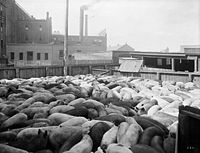- Meat packing industry
-
 The William Davies Company facilities in Toronto, Canada, circa 1920. This facility was then the second largest pork-packing plant in North America.
The William Davies Company facilities in Toronto, Canada, circa 1920. This facility was then the second largest pork-packing plant in North America.
The meat packing industry handles the slaughtering, processing, packaging, and distribution of animals such as cattle, pigs, sheep and other livestock. The industry is primarily focused on producing meat for human consumption, but it also yields a variety of by-products including hides, feathers, dried blood, and, through the process of rendering, fat such as tallow and protein meals such as meat & bone meal.
In the U.S. and some other countries, the facility where the meat packing is done is called a meat packing plant; in New Zealand, where most of the products are exported, it is called a freezing works. An abattoir is a place where animals are slaughtered for food.
Contents
History in the United States
The meat packing industry grew with the construction of the railroads and methods of refrigeration. Railroads made possible the transport of stock to central points for processing, and the transport of products throughout the nation.
The publication of the Upton Sinclair novel The Jungle in the US in 1906, shocked the public with the poor working conditions and unsanitary practices in meat packing plants in the United States, specifically Chicago. Meat packing plants, like many industries in the early 20th century, were known to overwork their employees, failed to maintain adequate safety measures, and actively fought unionization. In the early part of the century, they used the most recent immigrants and migrants as strikebreakers in labor actions taken by other workers, also usually immigrants or early descendants.
In the 1930s and early 1940s, however, workers achieved unionization under the CIO's United Packinghouse Workers of America (UPWA). An interracial committee led the organizing in Chicago, where the majority of workers in the industry were black, and other major cities, such as Omaha, Nebraska, where they were an important minority in the industry. UPWA workers made important gains in wages, hours and benefits. In 1957 the stockyards and meat packing employed half the workers of Omaha. The union supported a progressive agenda, including the Civil Rights Movement of the 1960s. While the work was still difficult, for a few decades workers achieved blue-collar, middle-class lives from it.
Mid-century restructuring by the industry of the stockyards, slaughterhouses and meat packing led to relocating facilities closer to cattle feedlots and swine production facilities, to more rural areas, as transportation shifted from rail to truck. It has been difficult for labor to organize in such locations. In addition, the number of jobs fell sharply through technology and other changes. Wages fell during the latter part of the 20th century, and eventually, both Chicago (in 1971) and Omaha (in 1999) closed their stockyards for good. Historically, the other major meat packing cities in the United States were South St. Paul, Minnesota, East St. Louis, Illinois, Dubuque, Iowa, Kansas City, Missouri, Austin, Minnesota, Sioux Falls, South Dakota, and Sioux City, Iowa.
Though the meat packing industry has made many improvements since the early 1900s, extensive changes in the industry since the late 20th century have caused new labor issues to arise. Today, the rate of injury in the meat packing industry is three times that of private industry overall, and meat packing was noted by Human Rights Watch as being "the most dangerous factory job in America". The meatpacking industry continues to employ many immigrant laborers, including some who are undocumented workers. In the early 20th century the workers were immigrants from eastern and southern Europe, and black migrants from the South. Today many are Hispanic, from Mexico, Central and South America. The more isolated areas in which the plants are located put workers at greater risk due to their limited ability to organize and to seek redress for work-related injuries.[1][2][3]
Meatpackers
These are major historical and current meat packers in the United States.
- Armour and Company
- Cargill Meat Solutions
- Cudahy Packing Company
- Greater Omaha Packing Company
- Lomen Company
- Whormel Foods
- Smithfield Foods
- Tyson Foods
- Perdue Farms
- Swift Packing
+ Foster Farms These are some outside the United States.
- Imperial Cold Storage and Supply Company (South Africa)
- William Davies Company
- Maple Leaf Foods (Canada)
- Schneider Foods (Canada)
- JBS S.A. (Brazil)
- AFFCO Holdings (New Zealand)
Notes
- ^ Greenhouse, Stephen "Meatpacking Industry Criticized on Human Rights Grounds", The New York Times
- ^ "Blood, Sweat, and Fear" Human Rights Watch
- ^ "The Shame of Postville, Iowa", The New York Times
References
- Hinman, Robert B., Harris, Robert B. The Story of Meat. Swift & Company, 1939. Katherine
External links
Categories:- Meatpacking
- Meat industry
- African American history
- Congress of Industrial Organizations
- History of labor relations in the United States
- Packaging
Wikimedia Foundation. 2010.

